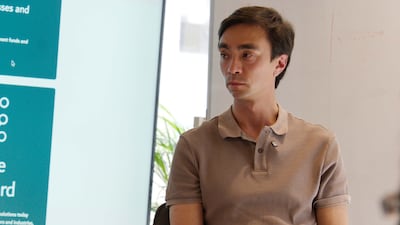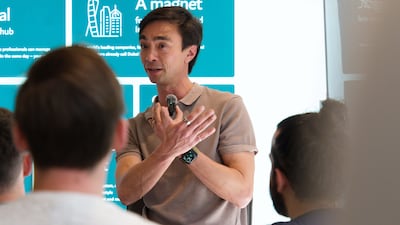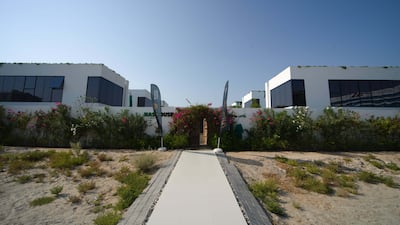The Solana blockchain launched a three-week gathering of Web3 specialists in Dubai, which aims to attract hundreds of international start-ups and their developers to help the California-based platform establish a local presence and role in the UAE's national crypto strategy.
The event from October 6 to 26 kicked off last week with the gathering of about 450 visitors in its first week. They attended workshops held at an enclave of six villas in Al Barsha. Thirty-five guests stayed overnight at the venue where there are five private swimming pools, a fitness centre, and a cat room to de-stress from day-long computing.
Alex Scott, leader of Solana's Superteam, said while global cryptocurrency and other Web3 companies have set up in the UAE, Solana is one of the few blockchains – or decentralised ledgers – establishing a strategic and long-term occupancy.
“Solana's Superteam Founders' Villa is the only event of its kind and scale in the UAE,” he told The National. The previous event in February brought in $100,000 in deals, and four new companies were set up in Dubai, while five founders relocated.
The momentum is growing, according to Solana, which expects to double the number of start-up founders in attendance from last year and who are considering a base in Dubai. About 50 founders attended February's gathering, excluding each company's team of developers.
“We're pioneering this approach of bringing global blockchain talent together for an extended period to collaborate and build in the heart of Dubai,” Mr Scott added.
What they are building, he said, is their Web3 businesses on Solana's blockchain and also in the UAE.
The gathering is more than just a meet-up opportunity for techies, he added. It is an chance for founders and developers to learn how to operate within the UAE government’s framework.
The Dubai Department of Economy & Tourism (DET) and Abu Dhabi Global Markets (ADGM) had representatives at the first week of the event and they met with the incoming talent to discuss their needs.
Mert Mumtaz, co-founder and chief executive of Helius, is one of them, and his company is the largest developer platform on Solana. He said this momentum is a catalyst for building “the new internet” at the heart of the UAE’s fast-growing industry.
“The opportunity to collaborate with talented and hungry minds while having direct access to government officials and regulatory insights is something I've never seen before,” said Mr Mumtaz, who moved his business from Toronto to Dubai in September.
It’s “not only attracting talent to the UAE but also positioning Solana and its builders at the forefront of the coming stablecoin revolution”, he said.
Global attraction
The UAE Central Bank in June announced its plans to establish a clear operational framework next year with its anticipated launch of a dirham-backed stablecoin.
Tether – the issuer of the world's largest stablecoin – said in August it plans to launch the dirham-pegged stablecoin in partnership with Abu Dhabi-based Phoenix Group and Green Acorn Investments.
The coin issuance is expected to push the use of cryptocurrencies more into the mainstream. The framework would allow businesses in the Emirates to accept the UAE stablecoin for goods and services including instant payments for rent, utilities, or large purchases, and reducing remittance costs for sending money abroad.
This also means that major cryptocurrencies such as Bitcoin and Ether, along with US dollar-backed stablecoins such as Tether or Binance USD, will not be allowed for these types of payments in the Gulf state.
The UAE's proactive approach to crypto regulation is yielding results. Henley and Partners, a London-based investment migration consultancy, reported in August that the UAE now ranks third globally in crypto adoption, behind Singapore and Hong Kong (China).
The Henley Crypto Adoption Index 2024 cites several factors contributing to this high ranking, including strong government support, a thriving start-up scene, and a highly digitalised and wealthy population.

This aligns with earlier data from crypto payments service provider Triple-A, which in 2023 ranked the UAE as the No 1 country by crypto ownership, with 30.4 per cent of the population (about three million) owning digital assets.
Solana envisions the future dirham-based stablecoin as a way to acquire new users in the Middle East and also existing ones who can transact with UAE companies.
Entering at this stage in the UAE’s stablecoin planning, said Mr Scott, is helping Solana earn “a first-mover advantage”. This involves boosting the adoption of blockchain technology with traditional finance, including the use of the UAE stablecoin to pay for a utility bill on a bank app, or other expenses.
“Imagine earning a dirham-denominated yield on a Decentralised Finance (DeFi) platform like Flash Trade, a UAE company, and using that to pay your rent in Abu Dhabi,” said Mr Scott. A dirham-backed stablecoin would enable this and many other innovative use cases, he added.
Victoria Wells, a Dubai-based crypto lawyer, said such ideas are opening the doors for more enabling government policies to make such payment systems a mainstream reality one day.
“As stablecoins proliferate, we're seeing increased regulatory attention, particularly in regions like MENA,” she told The National.
This type of co-operative guidance and ecosystem building from global platforms such as Solana is communicating to virtual asset service providers that the Middle East “is the region to be”, she said,






